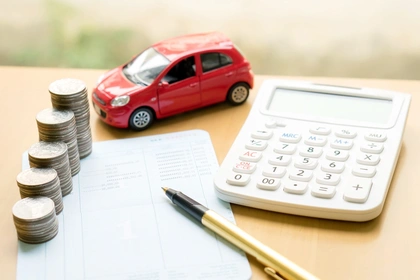What is the difference between conditional sale and hire purchase car finance?
While you’ll often see conditional sale and hire purchase car finance used interchangeably, there are differences between the two loan options. With a hire purchase agreement, you’ll usually pay a deposit, followed by fixed monthly repayments for the duration of the loan term. The amount to borrow will be based on the car’s full purchase price, and so payments may be higher than they would be with other finance types.
While many HP loans will result in the borrower taking ownership of the vehicle, you will have the choice not to purchase it. That’s why you’ll typically need to pay a small ‘Option to Purchase’ admin fee to become the car’s legal owner.
In contrast, with a conditional sale, there is no ‘Option to Purchase’ fee. You’ll automatically become the car’s legal owner once you’ve made your final monthly payment.
It’s this important difference that means you are committed to taking ownership of the vehicle as soon as you sign your conditional sale agreement.
How does conditional sale work?
If you’re considering applying for a conditional sale agreement, you’ll usually need to start the process by getting a quote and making an application online.
You’ll typically need to pass a credit check and an affordability check to demonstrate that you can keep up with your monthly repayments over the full loan term.
Each lender or car finance broker may ask you to supply different details as part of your application, but these will often include:
- Your personal details, including your full name and date of birth
- Your current address and three years’ address history in the UK
- Your employment details, including your current job title and salary
- Your bank details
- The amount you’d like to borrow
These details will be used to conduct a soft credit check to find out if you’re eligible for a conditional sale loan. This check won’t be visible to other lenders and it won’t affect your credit score.
What are the pros and cons of a conditional sale agreement?
There are many reasons why a conditional sale agreement might be the best choice for you and your circumstances, but it’s not right for everyone.
Here are some of the pros and cons of conditional sale car finance:
Pros
- You’ll automatically own the car once you reach the end of your agreement
- You won’t usually have to agree to any mileage restrictions
- Depending on your circumstances, no-deposit options are available
- The interest rate will be fixed throughout the loan
- There’s no large balloon payment at the end of your loan term
Cons
- You won’t own the car until you reach the end of your loan term
- You can’t sell or modify the car during the loan period without the lender’s permission
- Monthly repayments can be higher than they would be with other types of car finance
- You might find yourself in negative equity as the car depreciates over time
- You won’t have the option to hand the car back if you don’t want to become its legal owner
Am I eligible for a conditional sale agreement?
Whether you’ve had different forms of finance in the past or are making an application for the first time, it’s understandable that you may be worried about your eligibility. Each car finance lender has different eligibility criteria that applicants must meet to qualify for a conditional sale loan. Even so, they will typically take your current income, credit score, credit history, and affordability into account before deciding to issue an approval in principle.
Car finance in the UK is available only to people aged 18 or over, and while loans are available to those with a provisional licence many lenders will require applicants to have a full UK driving licence to qualify.
Which documents will I need for a conditional sale agreement?
Different car finance lenders may ask you to send different documents, but you’ll probably be asked to supply:
- Proof of income (e.g., recent bank statements or payslips)
- Proof of address (e.g., a utility bill or council tax statement)
- Proof of ID (e.g., a passport or full UK driving licence)
Can I end a conditional sale agreement early?
When you sign a conditional sale agreement, you’ll usually not only commit to taking ownership of the car at the end of your term, but also to making repayments for a period that will typically range from two to five years. A lot can change in that time. Perhaps your family has grown and you need a larger vehicle with space for the kids. Maybe you’ve been made redundant and are finding it hard to keep up with your monthly repayments. Life isn’t always predictable.
If you need to end your conditional sale agreement early, there are a few options available to you. Remember that you won’t own the car until you’ve finished making all your repayments, so you can’t sell or swap the vehicle until you’ve settled the contract.
Settlement figure
The settlement figure is the amount you’ll need to pay to end your conditional sale agreement early and become the car’s legal owner. Typically, this amount will be made up of your remaining repayments minus any future interest. Depending on the terms of your loan, you might also need to pay an administration fee or early repayment charge. You can contact your finance company directly to receive your settlement figure and it will usually remain valid for up to 28 days. Check your loan paperwork to find their contact details.
Voluntary termination
If you have outstanding finance to pay on your conditional sale loan but can no longer afford to make your repayments, you may want to opt for voluntary termination. Under UK law, you have the legal right to terminate your car finance agreement if you’ve already paid 50% of the total amount payable. However, you don’t need to wait until you reach this point to exercise your right to voluntary termination. You can pay to make up the difference until you reach the 50% threshold. If you’re eligible, you can let the lender know that you wish to opt for voluntary termination, pay any outstanding fees, hand the car back, and walk away.
What other car finance options are available?
PCP Car Finance
Personal contract purchase (PCP) car finance is like a conditional sale as it’s also a loan that’s secured against the car and allows you to split the cost of a new or used vehicle into fixed monthly repayments. But it also gives you options at the end of your agreement. You won’t automatically own the vehicle; instead, you can choose to hand it back to the lender, purchase it by paying the one-off balloon payment or use any positive equity as a deposit in a new car loan.
Personal Loan
A personal loan is a type of unsecured borrowing that you can use to buy a car. You’ll make monthly repayments, but as soon as you’ve used the loan to pay the car’s seller, the vehicle will be all yours. You can do whatever you like with the car from the outset, including modifying or selling it. As the loan is unsecured and poses a higher risk to the lender, you may need to have a good credit score and history to qualify for this type of finance.
Personal Contract Hire
If car ownership isn’t important to you, personal contract hire (PCH) might be a good option to consider. PCH (or leasing) is a form of long-term car rental that is often available only on new cars. You’ll have to make fixed monthly payments, agree to a set mileage, and keep the car in good condition, but when you reach the end of your agreement, you can simply hand the car back to the lender.
Get Car Finance up to £100,000
- Check your eligibility without impacting your credit score
- No deposit needed
- Rates from 8.9%* APR
'Representative Example: Borrow £12,000 over 5 years with a £0 deposit. Representative 20.5% APR fixed rate. Monthly payment: £309.93. Option to purchase fee £10 payable. Total cost of credit: £6,605.80. Total amount repayable: £18,605.80.
We are a credit broker, not a lender. We partner with CarFinance 247 Limited, a credit broker (not a lender) who works with a wide panel of lenders.
Disclaimer: We make every effort to ensure content is correct when published. Information on this website doesn't constitute financial advice, and we aren't responsible for the content of any external sites.






